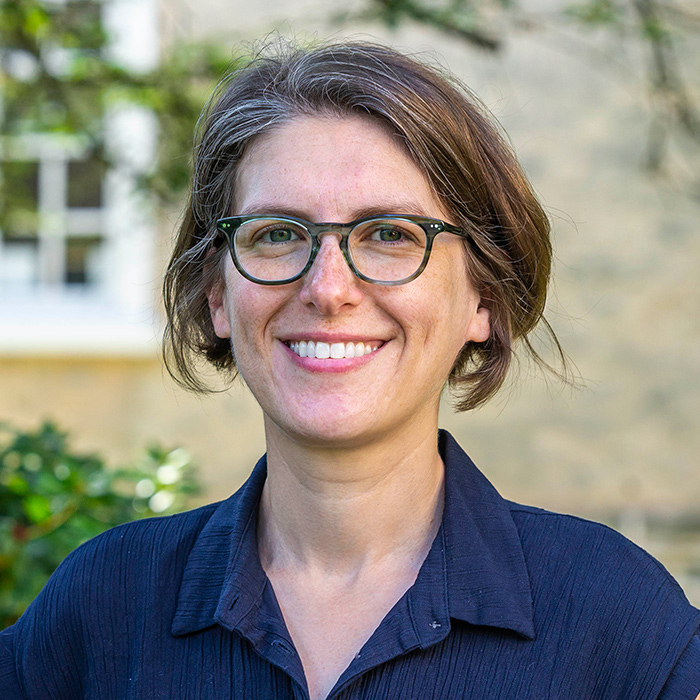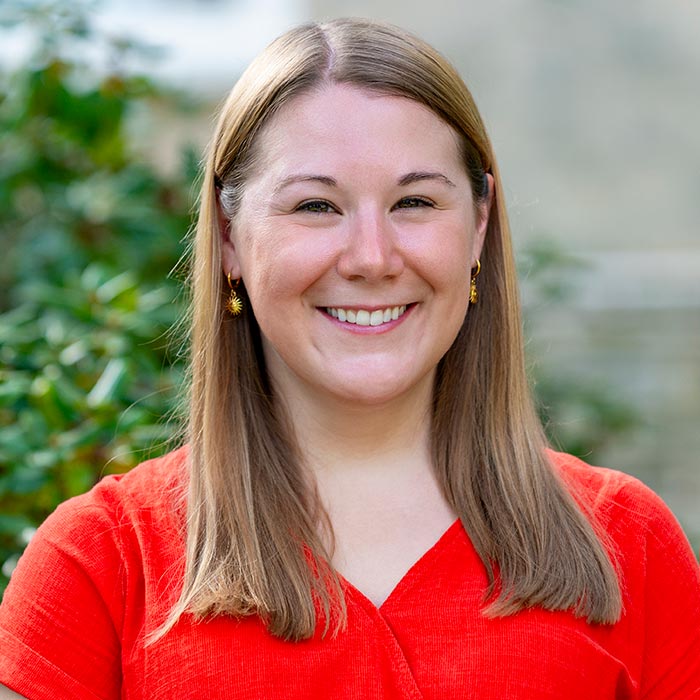The Nan and Bill Harris Digital Scholarship Commons on level 2 of Lutnick Library is an active space that serves as a nexus of library expertise, collections, and technology. The Commons features flexible seating, Google Jamboards for collaborative work, and technology-rich group study rooms. It is also adjacent to the William J Marsden, Jr. 1978 Quaker & Special Collections and Digital Scholarship Classroom. Photo: Chuck Choi.
Haverford CollegeLibraries
Digital Scholarship
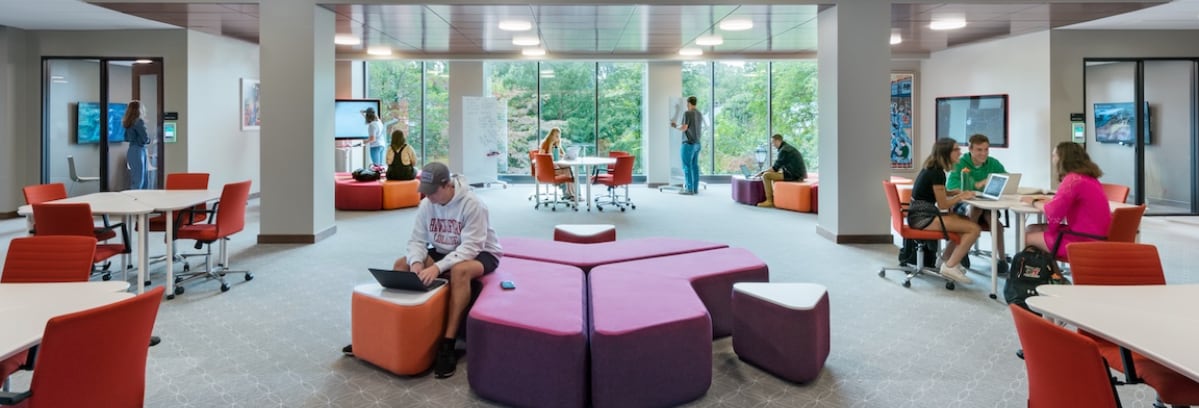
Digital Scholarship critically applies technology to scholarly inquiry, asking new kinds of questions and creating new forms of knowledge in the research, teaching, and learning of the Haverford College community.
We support
- Digital scholarship and projects through all phases of a project lifecycle: from ideation and development to sunsetting and archiving
- One-on-one consultations with faculty, staff, students, and communities
- OER setup, onboarding, and troubleshooting
- Project planning and project design with an emphasis on sustainability
- Recommendations on tools, platforms, and approaches for digital scholarship
- Seeking outside resources to support digital scholarship projects (i.e., grants or technical support outside of Haverford)
- Website development consultation with an emphasis on accessibility
- Digital storytelling
- Data curation, analysis, and visualization
- Text analysis
- Copyright advice
- Digital pedagogy consultation
- Scalable models for integrating digital scholarship projects into academic courses
- Assistance with developing assignments and rubrics tailored to digital projects
- In-class instruction on specific methods, tools, and approaches
- Collaboration with subject librarians to provide content and research support
Class Projects
We support a variety of class-based digital scholarship projects throughout the academic year. These include small, several-week projects, full-semester collaborations, and advising on tools and methods for individual projects. If you’re a faculty member interested in developing a digital project for a class, we recommend reaching out as early as possible. If you’re a student interested in learning more about a particular tool or have an idea for a digital project, please contact alacy@haverford.edu. Consultations can help you select the best tool for your project, align it with your research goals, and fit it within your own timeline.
To learn more about the types of class projects we support, check out these resources:
Job Opportunities
In addition to collaborating with students on class and independent digital scholarship projects, we also hire for a variety of positions during the academic year and summer. Digital scholarship assistantships, internships, and fellowships provide students with hands-on web development experience in a highly collaborative environment. Positions for the academic year are typically posted just prior to the start of the fall semester on the Student Employment Job Board. Summer internships are usually posted in early January.
To learn more about student job opportunities, check out these resources:
Who we are
Featured Projects
You can explore a sampling of projects we have created and supported below, or see links to our projects.
-
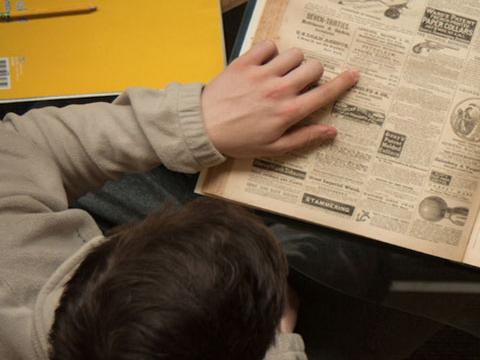
The Quaker Necrology is an index of nearly two thousand death notices and obituaries from Quaker periodicals from 1828 to the present. The searchable database serves as a valuable tool for historical and Quaker genealogical research. Prior availability of this resource was limited to on-location access to obituary references on index cards. Using Optical Character Recognition technology, students working for Haverford Libraries automated the transcription of the index cards and made the data available through this web application.
-
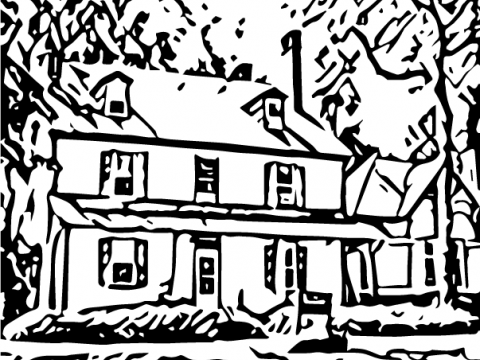
"HaverTales and BrynMarvels" is a collection of student-authored adaptations of The Canterbury Tales that brings Geoffrey Chaucer's text into dialogue with current social and political conversations, while collapsing the distance between the medieval and the modern. This project was created as part of Haverford professor Sarah Watson's English 201 course on The Canterbury Tales.
-
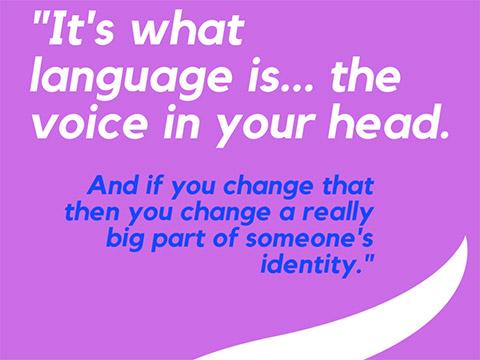
Students in Brook Lillehaugen’s Linguistic Diversity course designed and administered a survey exploring the range of languages spoken across the Bi-Co. They created this website to share their findings while raising awareness of and celebrating linguistic diversity on the campuses of Haverford and Bryn Mawr Colleges.
-
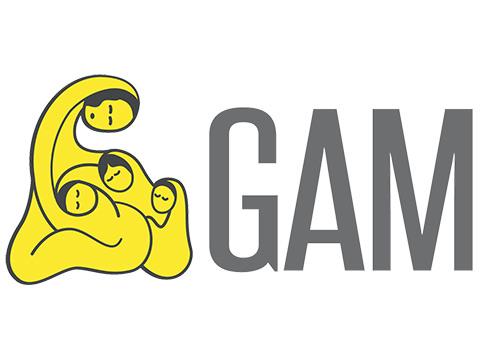
The Grupo de Apoyo Mutuo (GAM) is a human rights organization based in Guatemala City that seeks justice for the thousands of Guatemalans forcibly disappeared during the Internal Armed Conflict (1960-1996). Haverford students and librarians are collaborating with the GAM to digitize photos, clippings, and personal records in the GAM Archive to protect and preserve it for the future. This important digital archive tells the stories of the disappeared and ensures that they are not forgotten.
-
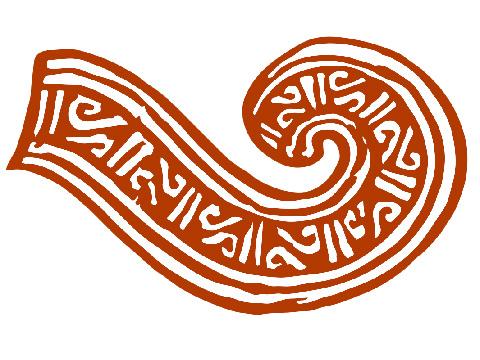
Zapotec is a family of indigenous languages spoken predominantly in the region of Oaxaca, Mexico. The Ticha project digitizes and analyzes a growing corpus of alphabetic texts written in Zapotec, Colonial Spanish, and other languages--the earliest dated to 1565—from various pueblos in the Central Valleys of Oaxaca. Led by Haverford Linguistics professor Brook Lillehaugen, this collaborative interdisciplinary project brings together faculty and students from multiple institutions, and Zapotec community members in the United States and Mexico.
-
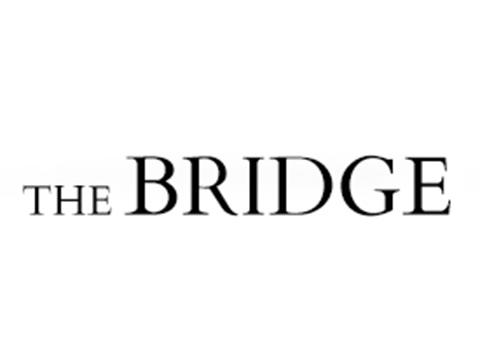
The Bridge, a language learning application conceived by Haverford Classics professor Bret Mulligan and built by Haverford student developers, helps students in Classics learning Latin and Ancient Greek create vocabulary lists based on past and future readings. It also has tools for “lemmatizing” texts, in which a list of head words and definitions can be generated from a text file.
-
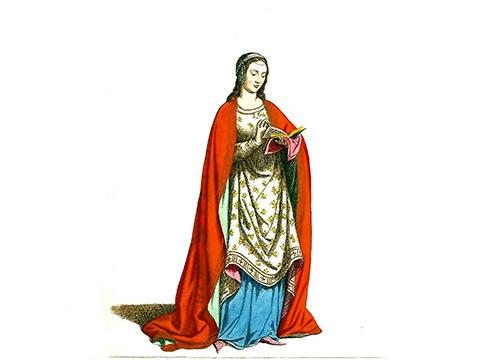
A collaboration between Haverford English professor Sarah Watson and S.C. Kaplan of Rice University, this project collects, organizes, and presents data related to late-medieval laywomen and their books. Through an interactive map of Europe, users can visualize networks of manuscripts, texts, and readers and explore the libraries and peregrinations of woman book owners.
-
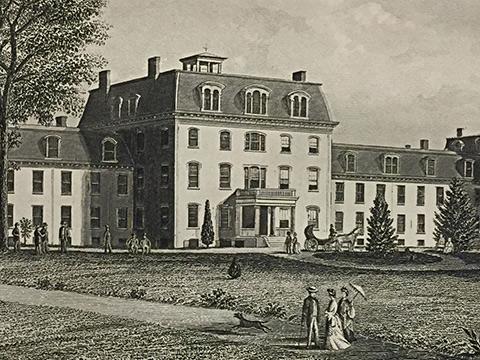
With generous support from the Scattergood Foundation, the Quakers and Mental Health project explores connections between the history of mental health care and Quakerism in nineteenth century America through the collection of the Friends Hospital, an early mental health facility in the Philadelphia area. The site features student-authored scholarship, digital collections materials, and data visualizations exploring life, care, and governance at the asylum.
-
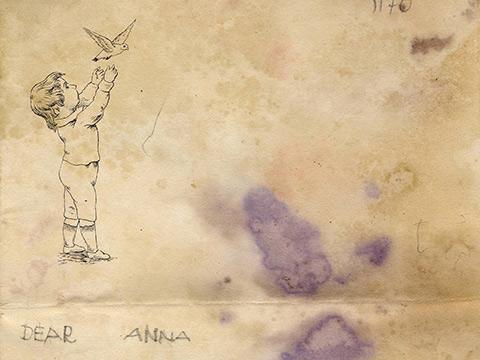
This project explores a collection of letters written by two prominent Philadelphia-area Quaker families. Using data visualizations, interactive maps, language analysis, and digital storytelling techniques, Haverford students explore the stories of the families, Quakerism, and Philadelphia in the nineteenth century.
